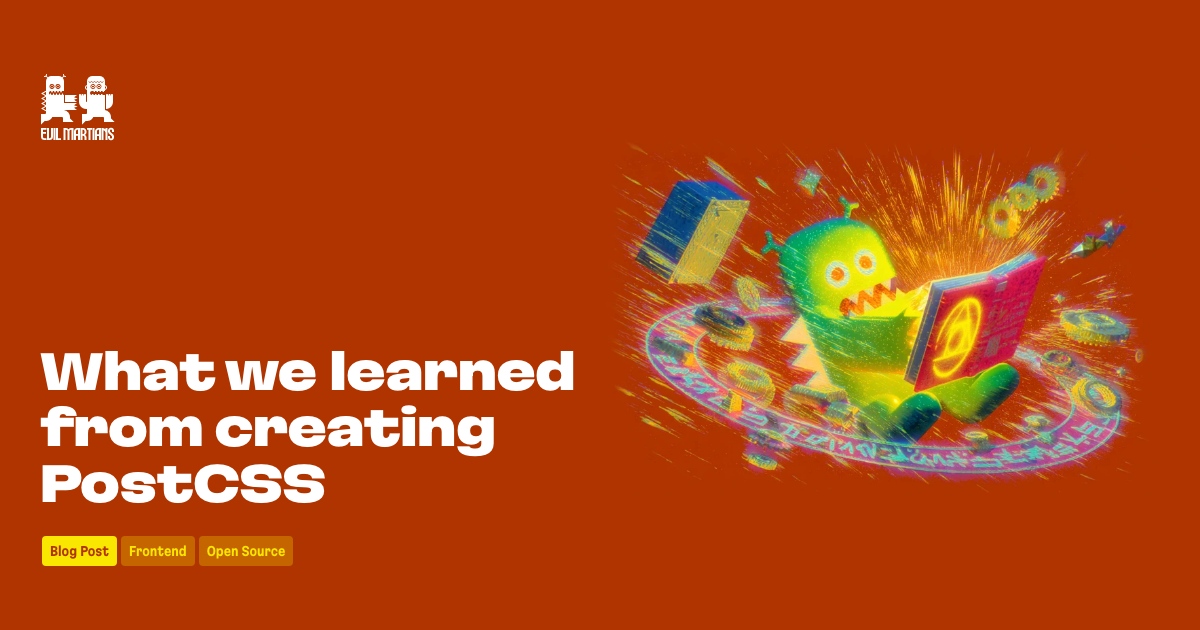Many students feel that universities and colleges aren’t doing enough to prepare them for a future shaped by artificial intelligence (AI), according to the latest study from OnCampus Research and Hostinger.
Although students are both curious and skeptical about AI, they’re not waiting for schools to catch up. Instead, they’re exploring AI on their own and using it in their daily lives.
To better understand how these students use, perceive, and experience AI, OnCampus Research and Hostinger conducted a survey in the US to learn more about how students view the role of AI in their academic experience.
AI and academia
Artificial intelligence has had a close relationship with academia since the 1950s. Dartmouth College hosted the first known workshop in 1956 about AI concepts and research inside classrooms. Yet, students in 2025 are still defining how AI works with and for them.
Since the mainstream appearance of the large language model (LLM) GPT3 back in 2020, AI has transformed several industries. But what about higher education?
Let’s examine the results of this survey to find out more about students’ views on the present and future of AI in education.
Our sample
We surveyed approximately 1,600 US students from undergraduate (77%) and graduate (23%) programs. In terms of age, 70% were between 18 to 24 years old, 19% were between 25 to 34, and 11% were older than 35.
The most represented fields of study among the respondents were:
- Science, technology, engineering or math (25%)
- Business (12%)
- Psychology and social sciences (12%)
- Health or related degrees (11%)
The rest (around 40%) came from the humanities, information technology, the arts, law, and education.
1. Universities are not doing enough with AI, according to most students

More than half of all respondents believe schools are not doing enough to prepare them for a future with AI. In total, 34% of students say there isn’t a clear focus on AI in their classes, and 23% said universities and colleges are falling behind.
2. Eight out of 10 students define themselves as “cautious” or “skeptical” about AI
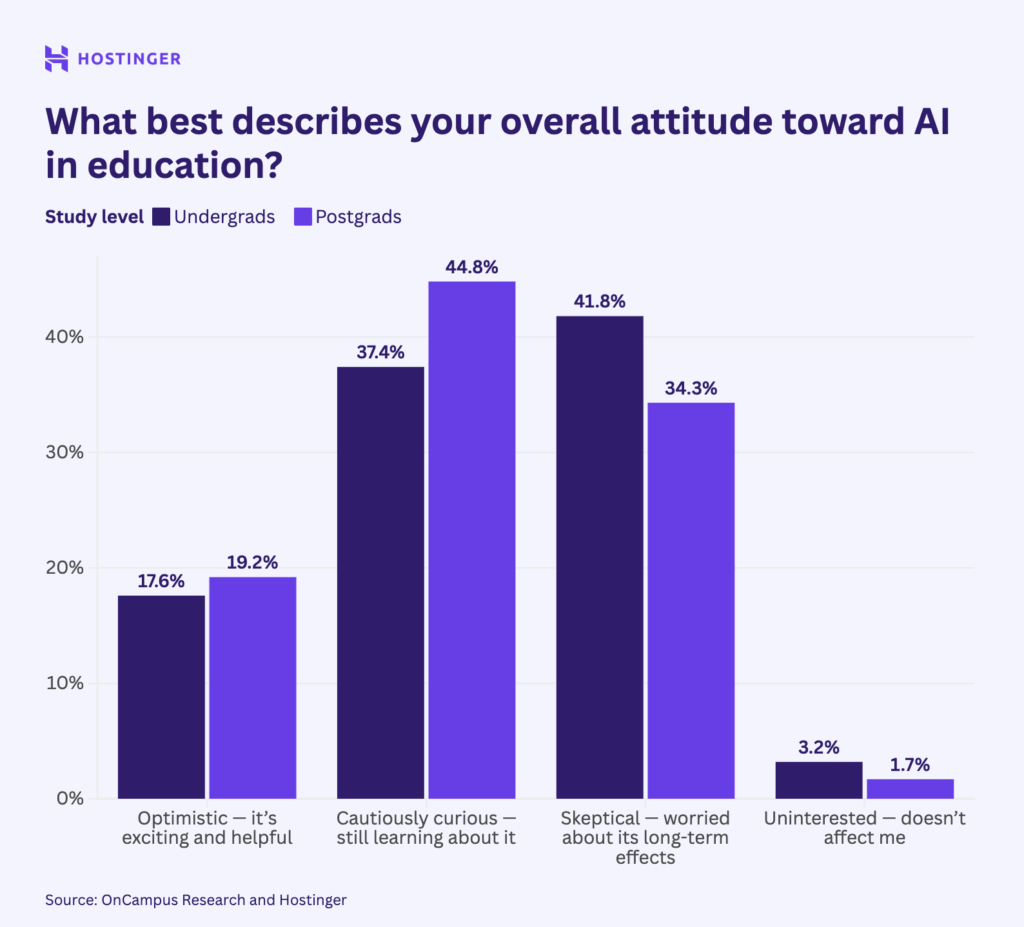
In general, 80% of all respondents define their stance towards AI as “cautious” or “skeptical.” When looking at undergraduates and postgraduate students separately, we see that these two groups have slightly different views:
- Almost half (45%) of master’s students defined themselves as “cautiously curious,” whereas 37% of undergraduates chose this answer.
- Forty-two percent of undergrads claimed to be worried about AI’s long-term effects, while 34% of master’s students shared this concern.
In other words, undergrads – usually younger than postgraduates – are more concerned about AI’s long-term effects. The opposite applies to master’s or PhD students: they are more curious than worried about the long-term effects of AI.
3. Most students are familiar with AI
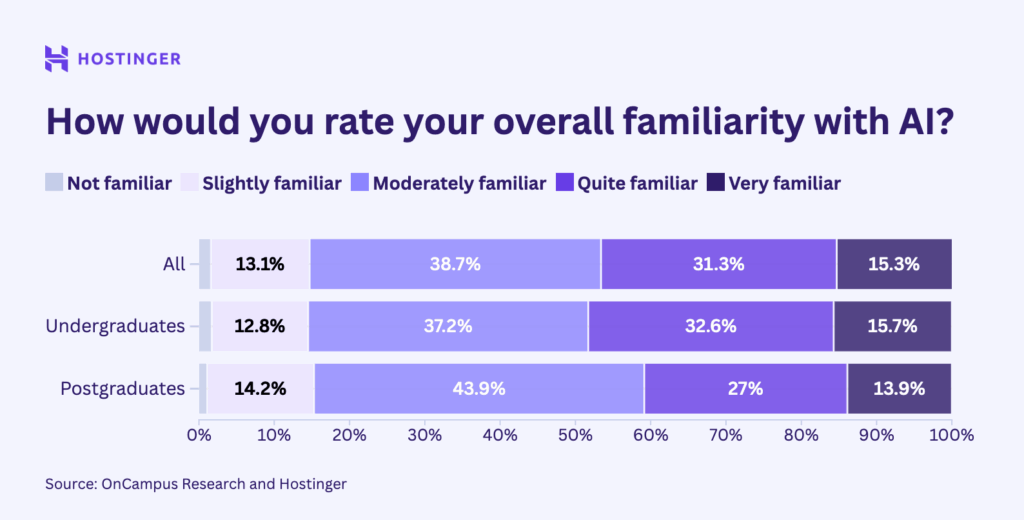
Statistics reflect the massive impact of AI in the last five years. Nearly half (46%) of all students feel comfortable or very familiar with AI, and 39% feel they have a reasonable understanding of it. Less than 15% of respondents claimed to be unfamiliar with AI.
4. Almost 70% of students have used AI for writing
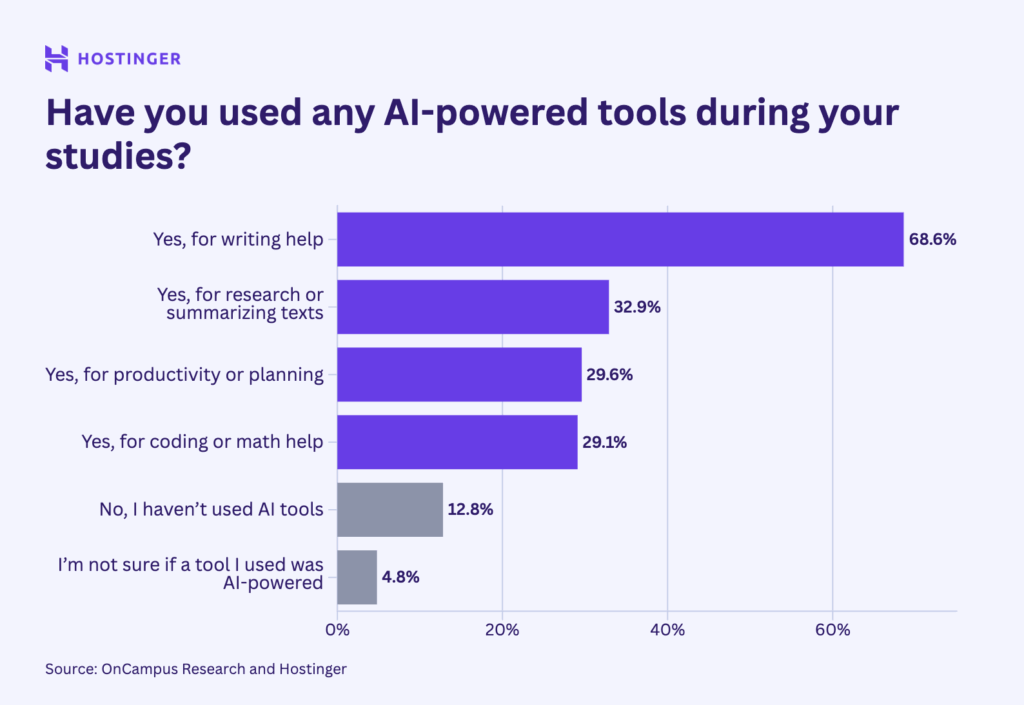
About 69% of students said they use AI to improve their writing. Around 30% of them said they use AI for each of the following tasks: researching, summarizing articles, planning, managing time, doing math, and writing code. Respondents were able to select more than one answer to this question.
5. AI saves time for other tasks in students’ lives
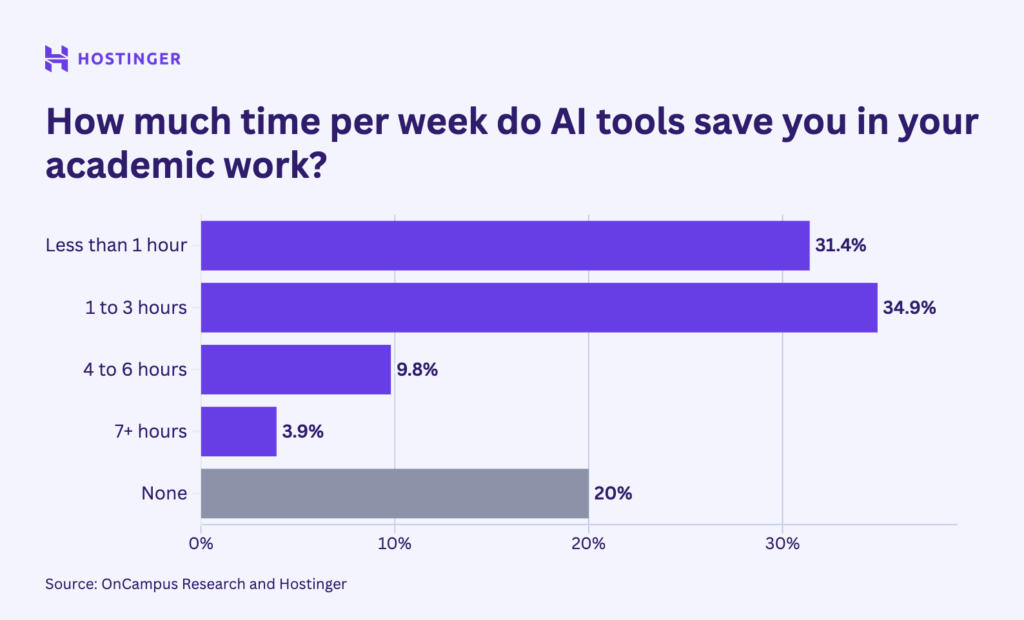
When OpenAI’s ChatGPT went viral in early 2023, one of the first arguments in favor of using such tech was how it would help people save time. According to our survey, on a weekly basis:
- 35% of students claim AI saves 1 to 3 hours of their time.
- 31% of students say it saves them less than 1 hour.
- Around 14% reported AI saving more than 4 hours of their time.
20% of respondents said AI does not save them time.
6. AI and time saving: Study, work or leisure
Based on these responses, nearly 80% of students use AI to make their routines more efficient.
What do they do with the time they save? About 28% said they use it to study more. Another 17% spend it working or running side hustles away from school. Other students prefer to use their saved time to rest (7%) or socialize (6%).
However, 28% said they either don’t save much time or are unsure if they do.
7. Reflecting on AI and academic performance: From indifference to confidence
People are questioning how work and academic processes could be automated with AI, from sales chatbots that filter leads to reviewing an essay. In the case of students, the interaction with AI raises a question of how it makes them feel about the final output and their academic performance. Our survey shows a wide range of emotions:
- 30% feel neutral about AI.
- 32% feel more confident and productive thanks to it.
- 19% feel anxious.
- 17% are indifferent.
- 2% feel overwhelmed.
8. One-third of students state AI helps boost concentration
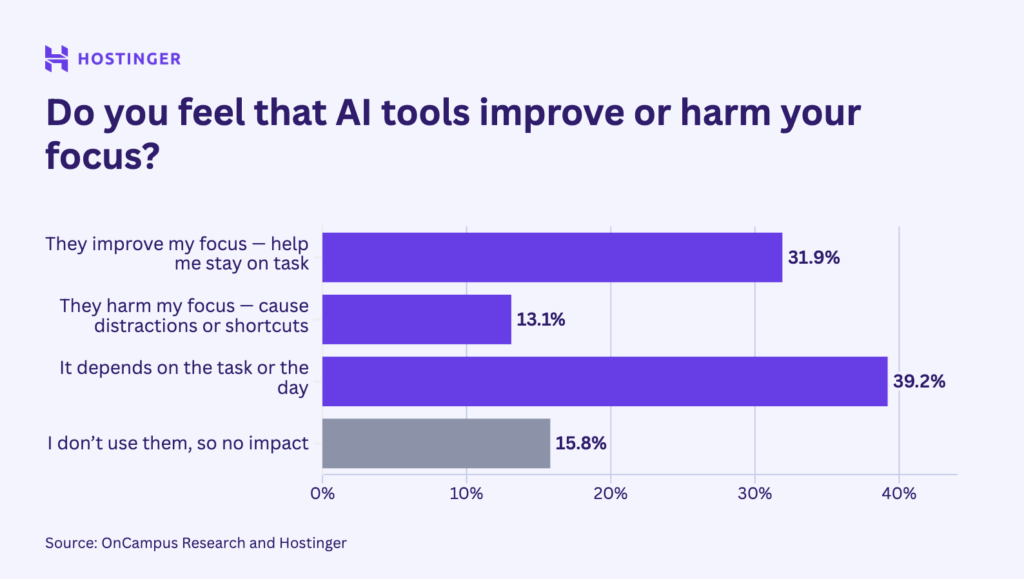
32% of surveyed students believe AI boosts their ability to concentrate. On the contrary, 13% of students said AI distracts them and makes it harder to focus.
Despite both perspectives, most of the students (40%) said that the degree to which AI influences their ability to focus depends on the task at hand and the day in question.
A view on the future of AI and academia
“This survey – like most studies out there – shows that AI is bringing major changes to society,” says Mantas Lukauskas, AI Tech Lead at Hostinger. “But what’s really changing is how quickly people can adapt. As the students’ answers show, some are eager to use AI, while others are more cautious and prefer to hold the brake.”
“At Hostinger, we believe AI makes access to knowledge and tools more democratic. Whether it’s a newsletter, a website, or a web app, AI lets you build what’s in your mind,” Mr. Lukauskas adds. “In education, the key question regarding AI should be how critical thinking can grow alongside creativity and deeper understanding.”
Final thoughts
Despite feeling that universities and colleges are falling short in preparing them for a future where AI use will be commonplace, students are independently engaging with it. They harbor fears and doubts about AI while using these tools to write, research, and plan.
Most students surveyed believe AI allows them to save 3 hours or less per day. Also, a large group of respondents indicated that their focus has improved, while others feel this varies depending on the task and the day.
The contrast between the negative and positive aspects of AI at universities reflects views on AI in the greater society. Academia is in a stage of adaptation, as AI is changing the way we develop the skills and knowledge required by society.
Methodology
- OnCampus Research and Hostinger launched the survey in May 2025. In total, we received 1,648 responses.
- The target audience of the survey was undergraduate and graduate students of United States colleges or universities.
- The survey was distributed through online forms.
- Responses were filtered by students’ current level of education.
The post University students: 80% are saving time thanks to AI appeared first on Hostinger Blog.



